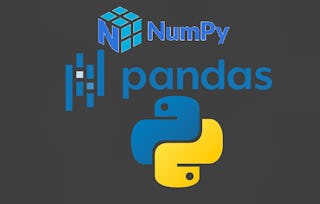Embark on a comprehensive journey into data analysis with Python and Pandas. Learn to set up Anaconda and Jupyter Lab on macOS and Windows, navigate Jupyter Lab's interface, and execute code cells.

Foundations of Data Analysis with Pandas and Python
Ends soon: Gain next-level skills with Coursera Plus for $199 (regularly $399). Save now.

Foundations of Data Analysis with Pandas and Python
This course is part of Data Analysis with Pandas and Python Specialization

Instructor: Packt - Course Instructors
2,882 already enrolled
Included with
(30 reviews)
Recommended experience
What you'll learn
Explain how to navigate and utilize Jupyter Lab for Python programming.
Write Python code, including functions and data structures.
Manipulate and analyze data using Pandas Series and DataFrames.
Apply data cleaning and sorting techniques to prepare datasets for analysis.
Skills you'll gain
Details to know

Add to your LinkedIn profile
4 assignments
See how employees at top companies are mastering in-demand skills

Build your subject-matter expertise
- Learn new concepts from industry experts
- Gain a foundational understanding of a subject or tool
- Develop job-relevant skills with hands-on projects
- Earn a shareable career certificate

There are 3 modules in this course
In this module, we will guide you through the initial setup required for this course, including installing the Anaconda distribution on both macOS and Windows, and creating Python environments using Anaconda Navigator. You'll also learn to unpack the provided course materials, navigate the Jupyter Lab interface, execute code cells, and import necessary libraries to get you started on your data analysis journey.
What's included
8 videos3 readings1 assignment
In this module, we will cover the essentials of Python programming, starting with the use of comments to enhance code readability. You'll gain familiarity with Python's basic data types, operators, variables, and built-in functions, laying the groundwork for effective coding. We will delve into custom functions, string methods, lists, indexing and slicing, dictionaries, and classes to build your programming skills. Finally, you will learn to navigate and use Python libraries within Jupyter Lab, a critical skill for data analysis.
What's included
12 videos1 assignment
In this module, we will explore the creation and manipulation of Pandas Series objects from different data sources like lists and dictionaries. We will delve into essential methods and attributes of Series, understand the use of parameters and arguments, and learn techniques to import data into Series using 'pd.read_csv'. Additionally, we will cover methods for inspecting, sorting, and extracting Series values, along with advanced operations like broadcasting and applying functions to Series elements.
What's included
21 videos1 reading2 assignments
Earn a career certificate
Add this credential to your LinkedIn profile, resume, or CV. Share it on social media and in your performance review.
Instructor

Offered by
Explore more from Data Analysis
 Status: Free Trial
Status: Free Trial Status: Free Trial
Status: Free Trial
Why people choose Coursera for their career




Learner reviews
30 reviews
- 5 stars
83.33%
- 4 stars
10%
- 3 stars
3.33%
- 2 stars
3.33%
- 1 star
0%
Showing 3 of 30
Reviewed on Jul 9, 2025
Great explanation and practice demonstrated concisely. Thank you Packt and Coursera

Open new doors with Coursera Plus
Unlimited access to 10,000+ world-class courses, hands-on projects, and job-ready certificate programs - all included in your subscription
Advance your career with an online degree
Earn a degree from world-class universities - 100% online
Join over 3,400 global companies that choose Coursera for Business
Upskill your employees to excel in the digital economy
Frequently asked questions
Yes, you can preview the first video and view the syllabus before you enroll. You must purchase the course to access content not included in the preview.
If you decide to enroll in the course before the session start date, you will have access to all of the lecture videos and readings for the course. You’ll be able to submit assignments once the session starts.
Once you enroll and your session begins, you will have access to all videos and other resources, including reading items and the course discussion forum. You’ll be able to view and submit practice assessments, and complete required graded assignments to earn a grade and a Course Certificate.
More questions
Financial aid available,



